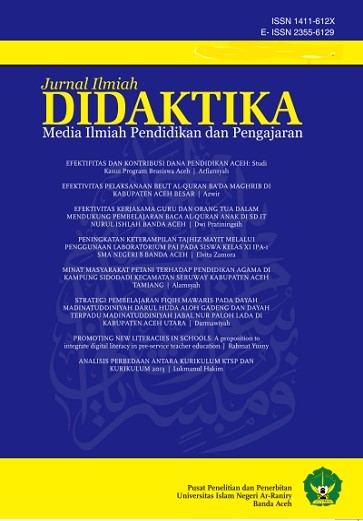ENAM METODE POLA ASUH ORANG TUA UNTUK PENINGKATAN SOCIAL SKILLS
DOI:
https://doi.org/10.22373/jid.v20i1.4772Keywords:
Metode Pola Asuh, Orang Tua, Social SkillsAbstract
Setiap anak membutuhkan pendidikan untuk peningkatan peranya di lingkungan masyarakat. Melalui proses pendidikan formal, nonformal, dan/atau informal pendidikan anak telah diselenggarakan untuk peningkatan kualitas keterampilannya, mengingat besarnya dan pentingnya proses pendidikan pola asuh anak tersebut maka tujuan penelitian untuk mengetahui besarnya pengaruh pola asuh orang tua terhadap social skills anak. Penelitian ini dilaksanakan di Kabupaten Malang. Proses menetapkan sampel menggunakan metode Nomograf Harry King. Jumlah sampel adalah 157, analisis menggunakan program Statistical Program Social Sciences (SPSS). Hasil penelitian ditemukan enam pola asuh orang tua untuk meningkatkan social skills yaitu menerima pendapat anak ketika melakukan Communication, Menanyakan kesalahan anak tanpa memarahi, Memberikan nasehat ketika anak berbuat salah, Memberi pujian pada anak jika melakukan tindakan yang positif, Memberi hadiah ketika anak pintar di sekolah, Memfasilitasi hobi yang disukai anak. Interpretasi analisisnya terjadi pengaruh asuhan orang tua kepada social skills anak pada usia dini. Dengan kata lain semakin tinggi kualitas social skills anak usia dini dipengaruhi oleh kualitas dan kuantitas pola asuh orang tua. Hasil pengujian statistik menunjukkan bahwa terjadi pengaruh yang signifikan antara pola asuh orang tua terhadap peningkatan social skills anak, formulasinya sebagai berikut Social skills = 1.2 + 0,712 Pola Asuh, yang bermakna apabila terjadi peningkatan kualitas asuahan orang tua, maka kualitas social skills akan bertambah menjadi 71.2%.
References
Aisyah, S., Amini, M., Chandrawati, T., Novita, D. Perkembangan dan konsep dasar pengembangan anak usia dini. Jakarta: Universitas Terbuka. 2010.
Baumrind, D. Current patterns of parental authority. Developmental Psychology Monographs, 4, 1-103. 1971.
Baumrind, D. The influence of parenting style on adolescent competence and substance use. The Journal of Early Adolescence, 11 (1), 56-95. (1991).
Cheung, Phoebe P.P., Siu, Andrew M,H, & Ted, B. Measuring social skills of children and adolescents in a Chinese population: Preliminary evidence on the reliability and validity of the translated Chinese version of the Social Skills Improvement System-Rating Scales (SSIS-RS-C). Research in Developmental Disabilities, 60, 187–197. 2017.
Chosak, S. Your living legacy: how your parenting style shapes the future for you and your child. Sarasota: Design Publishing. Inc. 2015.
Depdiknas. UU No. 20 Tahun 2003 Tentang sistem pendidikan nasional. Bandung: Citra Umbara. 2003.
Doan, S. N., & Wang, Q. Maternal discussions of mental states and behaviors: Relations to emotion situation knowledge in European American and immigrant Chinese children. Child Development, 81(5), 1490–1503. https://doi.org/10.1111/j.1467-8624.2010.01487
Hasan, M. (2009). Pendidikan anak usia dini. Yogyakarta: PT. Diva Press. 2010.
Hazrullah, & Furqon. Kompetensi Profesional Guru Bimbingan Konseling Dalam Pemecahan Masalah Belajar Siswa Di Man Rukoh Banda Aceh. Didaktika, 18(2), 245–258.
Irawati. (2009). Mendidik dengan cinta. Bekasi: Pustaka Inti. 2018.
Ilahi, M. T. Quantum parenting: Kiat sukses mengasuh anak secara efektif dan cerdas. Jogjakarta: Ar-Ruzz Media. (2013).
Fika Pijaki, N., Agustina, S. M., Lutfiah, V. L., & Yulianti, W. Konsep Pendidikan Birrul Walidain Dalam Qs . Luqman. Didaktika, 18(1), 16–31. 2017.
Kipp. K & Shaffer R. D Developmental psychology childhood and adolescence. United Stated Of America : Jon-David Hague. 2014
Luo, R., LeMondaa, C.S., Song, L. Chinese parent’s goals and practices in early childhood, Early Childhood Research Quarterly, 28, 843-857. 2013.
Lum, J.A.G., Powellc, M., Snowb, P.M. The influence of maltreatment history and out of home care on children’s language and social skills. Child Abuse & Neglect, 76, 65-74. http://dx.doi.org/10.1016/j.chiabu.2017.10.008. 2018.
Manzi, C., Roccato, M., Paderi, F., Vitrotti, S., Russo, S., The social development of right-wing authoritarianism: The interaction between parental autonomy support and societal threat to safety. Personality and Individual Differences, 109, 1–4. https://doi.org/10.1016/j.paid.2016.12.032. 2017.
Masitoh, O.S. & Djoehaeni, H. Pendekatan belajar aktif di taman kanak-kanak. Jakarta: Departemen Pendidikan Nasional. (2005).
Mustafa, K. I., & I, S. TEACHERS ’ CLASSROOM SUCH AS ANXIETY AND MOTIVATION TOWARD. Didaktika, 19(1), 1–15. 2018.
Nursalam. Konsep dan penerapan metodologi penelitian ilmu keperawatan pedoman skripsi. tesis dan instrumen penelitian keperawatan. Jakarta: Salemba Medika.
Narvaez, D., Wang, L., Gleason, T., Cheng, A., Lefever, J., & Deng, L. (2013). The evolved developmental niche and sociomoral outcomes in Chinese three-year- olds. European Journal of Developmental Psychology, 10(2), 106–127. 2003.
Olcer, S. & Aytar, A. A Comparative Study into Social Skills of Five-Six Year Old Children and Parental Behaviors. Procedia - Social and Behavioral Sciences, 141, 976 – 995. 2014.
Partini. (2010). Pengantar pendidikan anak usia dini. Yogyakarta: Grafindo Litera Media.
Pujo Suwarno. Communication orang tua dan anak. Bandung: Angkasa. 1994.
Santrock, J. W. Life-span development: perkembangan masa hidup jilid 1. Jakarta: Erlangga. (2002).
Schoppe, S. J., Mangelsdorf, S. C., & Frosch, C. A. Coparenting, family process, and family structure: Implications for preschoolers’ externalizing behavior problems. Journal of Family Psychology, 15, 526–545. (2001).
Supriadi, B. Pola Pembinaan Dan Pendampingan Kelompok Jasa Pemandu Wisata (Local Guide, Lg) Di Daya Tarik Wisata Gunung Bromo(Gb). penelitian (pp. 113–128). Malang: Unikama LPPM. (2013).
Supriadi B, ,W. Astuti, and A. Firdiansyah. “Green Product And Its Impact on Customer Satisfaction,” IOSR J. Bus. Manag., vol. 19, no. 8, p. 1 9. (2017).
Surbakti. (2012). Parenting anak-anak. Jakarta: Alex Media Karputindi.
Silalahi, K. & Meinarno E. Keluarga Indonesia: Aspek dan dinamika zaman. Jakarta: Raja Grafindo Persada. (2010).
Sugiyono. Metode Penelitian Kuantitatif Kualitatif R&D. Bandung: Alfabeta. (2015).
Vargas, C. Perceived parenting styles influence on contraceptive use among adolescents: a retrospective study on young adults’ behavior. Florida: University of Florida. (2010).
Wang, X., Bernas, R., & Eberhard, P. When a lie is not a lie: Understanding Chinese working-class mothers’ moral teaching and moral conduct. Social Development, 21(1), 68–87.(2012).
Wahyudi, D., & Wardani, Septya, D. Akhlak Melalui Multimedia Lcd Proyektor Dedi Wahyudi Devi Septya Wardani. Didaktika, 18(1), 1–15. (2017).
Webb, S., Janusa, M., Dukua, E., Raosa, R., Brownells, M., Forerc, B., Guhnc, M., Muhajarined, N. Neighbourhood socioeconomic status indices and early childhood development. Population Health. Population Health, 3, 48-56. (2017).
Winsler, A., Madigan, A.M., Aquilino, S.A., Correspondence between maternal and paternal parenting styles in early childhood. Early Childhood Research Quarterly, 20, 1–12. ://dx.doi.org/10.1016/j.ecresq.2005.01.007. (2005).
Yunus, K. R. & Dahlan, N. A. Child-rearing practices and socio-economic status: possible implication for children’s educational outcomes. Procedia-Social and Behavioral Sciences, 90, 251-259. (2013).









